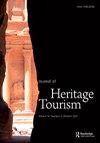Can cultural heritage be a successful strategy as a tourist experience? The case of tourist establishments in the mountains of Valencia, Spain
IF 2.2
Q2 HOSPITALITY, LEISURE, SPORT & TOURISM
引用次数: 0
Abstract
ABSTRACT The relationship between tourism and heritage has increased exponentially in recent years. According to the scientific literature, linking heritage to tourism promotes and improves the quality of the visitor experience. The main objective of this research is to identify the main heritage elements linked to tourism and the problems that may arise due to poor management of these heritage elements by the different stakeholders in the mountain region of Valencia, Spain. The study used a qualitative method involving interviews. A total of 15 semi-structured interviews lasting between 40 and 70 minutes were conducted in 12 mountain towns in the province of Castellón. The results indicate that there is a wide repertoire of very interesting heritage elements. However, the management of these elements is creating some problems that have had a negative impact on both the local population and visitors. This study has a series of implications for the various stakeholders. Firstly, these findings highlight the huge variety of heritage resources already in the area. Secondly, the study puts forward joint strategies for action in the field of heritage and tourism. Thirdly, we point out the risk of commoditization of tourism products for the natural and cultural environment of these rural areas.作为一种旅游体验,文化遗产能成为一种成功的策略吗?西班牙瓦伦西亚山区的旅游设施案例
近年来,旅游业与遗产之间的关系呈指数级增长。根据科学文献,将遗产与旅游联系起来可以促进并提高游客体验的质量。本研究的主要目的是确定与旅游相关的主要遗产元素,以及西班牙瓦伦西亚山区不同利益相关者对这些遗产元素管理不善可能产生的问题。本研究采用访谈的定性方法。在Castellón省的12个山区城镇共进行了15次半结构化访谈,时长在40到70分钟之间。结果表明,这里有很多非常有趣的遗产元素。然而,这些元素的管理产生了一些问题,对当地居民和游客都产生了负面影响。本研究对各利益相关者有一系列启示。首先,这些发现突出了该地区已经存在的各种各样的遗产资源。其次,研究提出了遗产与旅游领域的联合行动策略。第三,指出旅游产品商品化对农村自然文化环境的风险。
本文章由计算机程序翻译,如有差异,请以英文原文为准。
求助全文
约1分钟内获得全文
求助全文
来源期刊

Journal of Heritage Tourism
HOSPITALITY, LEISURE, SPORT & TOURISM-
CiteScore
6.50
自引率
11.10%
发文量
39
期刊介绍:
The Journal of Heritage Tourism ( JHT ) is a peer-reviewed, international transdisciplinary journal. JHT focuses on exploring the many facets of one of the most notable and widespread types of tourism. Heritage tourism is among the very oldest forms of travel. Activities such as visits to sites of historical importance, including built environments and urban areas, rural and agricultural landscapes, natural regions, locations where historic events occurred and places where interesting and significant living cultures dominate are all forms of heritage tourism. As such, this form of tourism dominates the industry in many parts of the world and involves millions of people. During the past 20 years, the study of tourism has become highly fragmented and specialised into various theme areas, or concentrations. Within this context, heritage tourism is one of the most commonly investigated forms of tourism, and hundreds of scholars and industry workers are involved in researching its dynamics and concepts. This academic attention has resulted in the publication of hundreds of refereed articles in various scholarly media, yet, until now there has been no journal devoted specifically to heritage tourism; Journal of Heritage Tourism was launched to fill this gap. JHT seeks to critically examine all aspects of heritage tourism. Some of the topics to be explored within the context of heritage tourism will include colonial heritage, commodification, interpretation, urban renewal, religious tourism, genealogy, patriotism, nostalgia, folklore, power, funding, contested heritage, historic sites, identity, industrial heritage, marketing, conservation, ethnicity, education and indigenous heritage.
 求助内容:
求助内容: 应助结果提醒方式:
应助结果提醒方式:


